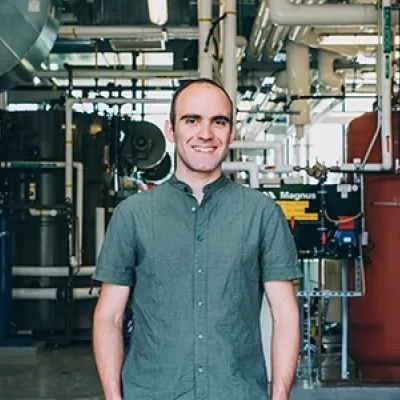For more than a century, a major part of McGill University’s Macdonald Campus has been heated with steam produced on-site and distributed by energy-consuming installations. The time had come for an update, one based on efficiency and energy diversification.
Implementation of energy efficiency measures
The first buildings on the campus opened in 1907, including a steam plant, at the forefront of modernity at the time. “Over the years, the system had become increasingly inefficient. First, new buildings were built on the campus, farther from the plant, and this distance led to losses in energy. Later, some parts of the network had reached the end of their useful life, especially the tunnels, whose critical condition threatened the integrity of the steam distribution system,” says Jérôme Conraud, Energy Manager, Installations and Ancillary Services at McGill University.
Rather than simply modernize the heating, the university completely renovated all the buildings, based on in-depth audits. The steam was replaced by a low-temperature warm water network that needs less energy. Production was relocated near the users to reduce losses, and a new thermal power plant and a satellite boiler room were built.
Various consumption-reduction measures were implemented. For example, a variable air volume ventilation system now adapts the heating to the actual occupancy of each room. Heat recovery systems were installed on the appliances that generated the most heat. And controls were mostly computerized, to the great pleasure of employees.
SAVINGS
$300,000
every year in heating costs
GRANT
$135,000
toward the implementation of energy efficiency measures and the recommissioning of existing mechanical systems
In total, the measures have affected 50,000 m² of the Faculty of Agricultural and Environmental Science's premises, which occupy 60% of the campus. Result: about $300,000 in savings each year in heating costs, according to Jérôme Conraud. “But improvements are continuing and we are going to save more as we optimize the configuration,” he says. These are significant savings, not to mention the initial grants of $90,000 for implementing efficiency measures and $45,000 for recommissioning the mechanical systems.
“Even without the grants, we would have opted for natural gas since, based on a detailed study of the various scenarios, a natural gas low-temperature warm water network was shown to be the most logical solution. Natural gas is affordable and it can easily be connected to renewable sources like solar or geothermal energy, which we are planning to develop in the future,” he added.
“Énergir assisted us a lot in this project, both the Sales Team for help in optimizing our accounts management, and the DATECH Group for their technical support and for seeking grants.”
Learn more about the program

Natural gas was shown to be the most logical solution.
Grant - Implementation of energy efficiency measures
Get up to $1/m3 of natural gas saved
Énergir's financial aid is $0.30 to $1 per cubic meter of natural gas saved for the first year following the implementation of an energy efficiency measure. The maximum amount of financial aid is $100,000 per account number serviced by natural gas. 1

Grants available for your business
Take advantage of Energir grants to add or replace natural gas equipment and reduce your energy costs. In addition to offering a better performance, natural gas is cheaper than electricity and fuel-oil.
